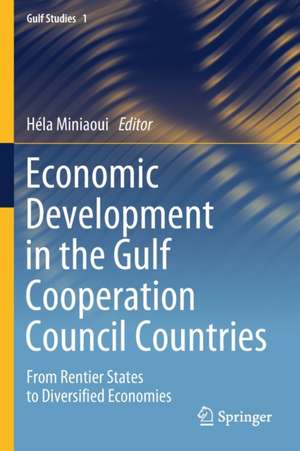Economic Development in the Gulf Cooperation Council Countries: From Rentier States to Diversified Economies: Gulf Studies, cartea 1
Editat de Héla Miniaouien Limba Engleză Paperback – 3 mai 2022
This book delves into the economic development of the six Gulf Cooperation Council (GCC) countries. Since the 1960s, the GCC states have harnessed their potential to exploit the wealth accrued from the oil boom to build their infrastructure and grow their economies. However, the high level of dependency on oil as the primary source feeding their output made their economies volatile and vulnerable to fluctuations in the global oil prices. Moreover, the plunge in oil prices and the threat of depletion of this natural resource pose serious challenges to the GCC countries. Consequently, the GCC governments have realized the importance of diversifying their economies following the need to move away from reliance on hydrocarbon.
This book contributes to the theoretical literature by enriching the debate on the transition of the GCC countries from rentier states to diversified economies. It helps students and scholars understand this transformation with an expansive comprehension of the contemporary challenges facing the region, as well as outlining prospects for the future.
This book contributes to the theoretical literature by enriching the debate on the transition of the GCC countries from rentier states to diversified economies. It helps students and scholars understand this transformation with an expansive comprehension of the contemporary challenges facing the region, as well as outlining prospects for the future.
| Toate formatele și edițiile | Preț | Express |
|---|---|---|
| Paperback (1) | 886.62 lei 43-57 zile | |
| Springer Nature Singapore – 3 mai 2022 | 886.62 lei 43-57 zile | |
| Hardback (1) | 892.59 lei 43-57 zile | |
| Springer Nature Singapore – 27 oct 2020 | 892.59 lei 43-57 zile |
Preț: 886.62 lei
Preț vechi: 1081.24 lei
-18% Nou
Puncte Express: 1330
Preț estimativ în valută:
169.65€ • 177.61$ • 140.38£
169.65€ • 177.61$ • 140.38£
Carte tipărită la comandă
Livrare economică 07-21 aprilie
Preluare comenzi: 021 569.72.76
Specificații
ISBN-13: 9789811560606
ISBN-10: 9811560609
Pagini: 208
Ilustrații: XII, 208 p. 4 illus.
Dimensiuni: 155 x 235 mm
Greutate: 0.32 kg
Ediția:1st ed. 2020
Editura: Springer Nature Singapore
Colecția Springer
Seria Gulf Studies
Locul publicării:Singapore, Singapore
ISBN-10: 9811560609
Pagini: 208
Ilustrații: XII, 208 p. 4 illus.
Dimensiuni: 155 x 235 mm
Greutate: 0.32 kg
Ediția:1st ed. 2020
Editura: Springer Nature Singapore
Colecția Springer
Seria Gulf Studies
Locul publicării:Singapore, Singapore
Cuprins
Chapter 1 Introduction.- Chapter 2 The Rentier States towards Diversification: Case Study Gulf States.- Chapter 3 Food Security in the GCC Countries, towards a more Diversified and Sustained Economic Strategies.- Chapter 4 The Evolution of the Economic Relations between Turkey and the GCC Countries from 2002 to 2018: Difficult Politics, Multidimensional Economic Interests.- Chapter 5 Economic Dimensions of Gulf Cooperation Council States– India Relations: Prospects and Challenges.- Chapter 6 The Gulf Crisis: The Economic Perspective and the Potential Role of Gulf Regional Hubs.- Chapter 7 Qatar from Rentier to Knowledge Based Economy: Current Achievements.- Chapter 8 Newly Implemented Labor Strategies by Qatar and Their Impacts on Economic Development.- Chapter 9 The Blessing behind Hosting Qatar's World Cup 2022.- Chapter 10 Qatar-Turkey Relations: What is in it for Qatar?.- Chapter 11 Food Security, Economic Diversification and Saudi’s Overture to East Africa The Case of Sudan (2008-2016).
Notă biografică
Dr Héla Miniaoui is Associate Professor of Economics in the Gulf in the Gulf Studies Program at Qatar University. She holds a PhD in Economics from University of Tunis El Manar, Tunisia. Her research focuses primarily on Economic Policies, Food Security, Sustainable Development and Islamic Banking & Finance, and has been published in various refereed journals. Dr Hela has consulting experience with the African Development Bank Group, Awqaf New Zealand and IDEA-Consult Tunisia. She serves on the editorial and review committees of several international journals. She is a member of The Middle East Economic Association (MEEA) and a research fellow at The Economic Research Forum (ERF).
Textul de pe ultima copertă
This book delves into the economic development of the six Gulf Cooperation Council (GCC) countries. Since the 1960s, the GCC states have harnessed their potential to exploit the wealth accrued from the oil boom to build their infrastructure and grow their economies. However, the high level of dependency on oil as the primary source feeding their output made their economies volatile and vulnerable to fluctuations in the global oil prices. Moreover, the plunge in oil prices and the threat of depletion of this natural resource pose serious challenges to the GCC countries. Consequently, the GCC governments have realized the importance of diversifying their economies following the need to move away from reliance on hydrocarbon.
This book contributes to the theoretical literature by enriching the debate on the transition of the GCC countries from rentier states to diversified economies. It helps students and scholars understand this transformation with an expansive comprehension of the contemporary challenges facing the region, as well as outlining prospects for the future.
This book contributes to the theoretical literature by enriching the debate on the transition of the GCC countries from rentier states to diversified economies. It helps students and scholars understand this transformation with an expansive comprehension of the contemporary challenges facing the region, as well as outlining prospects for the future.
Caracteristici
Covers a variety of different topics relating to economic development in the GCC countries within the context of the respective socio-cultural and political domains, with a spotlight on the effect of the Qatar diplomatic crisis Presents a selection of unique empirical case studies showcasing the economic development trajectories of the GCC countries Discusses key opportunities and challenges for the GCC countries in terms of their economic development and diversification strategies and policies















